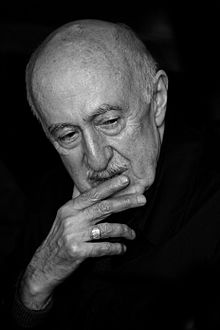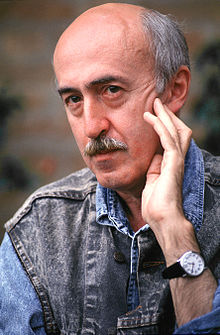fiction.wikisort.org - Director
Otar Iosseliani (Georgian: ოთარ იოსელიანი, born 2 February 1934) is a Georgian-born film director. He was born in the Georgian capital city of Tbilisi, where he studied at the Tbilisi State Conservatoire and graduated in 1952 with a diploma in composition, conducting and piano.[1]
Otar Ioseliani ოთარ იოსელიანი | |
|---|---|
 Otar Ioseliani in 2013, London | |
| Born | 2 February 1934 Tbilisi, Georgian Soviet Socialist Republic |
| Occupation | Film director |
| Years active | 1958–present |
Biography
In 1953 he went to Moscow to study at the faculty of mathematics, but in two years he quit and entered the State Film Institute (VGIK) where his teachers were Alexander Dovzhenko and Mikhail Chiaureli. While still a student, he began working at the Gruziafilm studios in Tbilisi, first as an assistant director and then as an editor of documentaries.
In 1958 he directed his first short film Akvarel. In 1961 he graduated from VGIK with a diploma in film direction. When his medium-length film Aprili (1961) was denied theatrical distribution, Iosseliani abandoned filmmaking and in 1963–1965 worked first as a sailor on a fishing boat and then at the Rustavi metallurgical factory. Aprili was finally released only in 1972.
In 1966 he directed his first feature film Giorgobistve that was presented at the Critics' Week at the 1968 Cannes Film Festival and won a FIPRESCI award there. When his 1976 film Pastorali was shelved for a few years and then granted only a limited distribution, Iosseliani grew sceptical about getting any artistic freedom in his homeland. Following Pastorali's success at the 1982 Berlin Film Festival, the director moved to France where in 1984 he made Les Favoris de la Lune. The film was distinguished with a Special Jury Prize at the Venice Film Festival. Since then Venice became a showcase for all his subsequent films.
In 1986 he was a member of the jury at the 36th Berlin International Film Festival.[2]
In 1989 he again received a Special Jury Prize for Et la Lumiere Fut and in 1992 the Pasinetti Award for Best Direction for La Chasse aux Papillons. After the dissolution of the Soviet Union he continued to work in France where he made the documentary Seule Georgie (1994) which was followed by the sardonic and allegorical Brigands - Chapitre VII (1996).
In 1995 he was a member of the jury at the 19th Moscow International Film Festival.[3]
In 2011 his film Chantrapas was selected as the Georgian entry for the Best Foreign Language Film at the 84th Academy Awards,[4] but it did not make the final shortlist.[5]
In 2011 Otar Iosseliani received a lifetime achievement honor – the CineMerit Award at the Munich International Film Festival. It was given by his former pupil, a Georgian filmmaker Dito Tsintsadze.[6][7]
Political views
Iosseliani holds political views that are considered Russophobia by some observers.[8] In particular, in the aftermath of the 2008 Russo-Georgian war he expressed his political views in an interview to Ukrainian Weekly 2000 news agency:
We (Georgians) will never be at peace with Russia again. Previously we felt contempt for it, but now what we feel is hatred -- and this is very serious. So, go live with your Russians the way you want to. [...] But there will be no way back! (for Georgians) Two hundred years of patience and contempt are over now![9]
(Georgia has been a part of the Russian Empire from 1801 and later part of the USSR until 1991.)
In 2011, while appearing on Echo of Moscow, Ioseliani claimed that journalists intentionally distorted his words about Russians and attributed to him things he had never said.[10]
Filmography

- Akvarel (1958) (TV)
- Sapovnela (1959)
- April (1961) / Ap'rili
- Tudzhi (1964)
- Falling Leaves (1966) / Giorgobistve
- Georgian Ancient Songs (1969) / Dzveli qartuli simgera
- Once Upon a Time There Was a Singing Blackbird (1970) Iqo shashvi mgalobeli
- Pastorale (1975) / Past'orali
- Lettre d'un cinéaste (1982) (TV)
- Sept pièces pour cinéma noir et blanc (1983)
- Euzkadi été 1982 (1983) (TV)
- Favorites of the Moon (1984) / Les Favoris de la lune
- Un petit monastère en Toscane (1988)
- And Then There Was Light (1989) / Et la lumière fut
- Chasing Butterflies, aka Hunting Butterflies, aka The Butterfly Hunt (1992) / La Chasse aux papillons
- Seule, Georgie (1994)
- Brigands-Chapter VII (1996) / Brigands, chapitre VII
- Farewell, Home Sweet Home (1999) / Adieu, plancher des vaches!
- Monday Morning (2002) / Lundi matin
- Gardens in Autumn (2006) / Jardins en automne
- Chantrapas (2010)
- Winter Song (2015) / Chant d'hiver
References
- Peter Rollberg (2009). Historical Dictionary of Russian and Soviet Cinema. US: Rowman & Littlefield. pp. 290–292. ISBN 978-0-8108-6072-8.
- "Berlinale: 1986 Juries". berlinale.de. Retrieved 2011-01-14.
- "19th Moscow International Film Festival (1995)". MIFF. Archived from the original on 2013-03-22. Retrieved 2013-03-16.
- "Georgia elige "Chantrapas" para los Oscar". Retrieved 2011-10-01. Also verified with Georgian National Film Centre
- "9 Foreign Language Films Vie for Oscar". Retrieved 2012-01-19.
- "John Malkovich, Otar Iosseliani to Receive Lifetime Achievement Awards at Munich Film Festival". Hollywood Reporter. Retrieved 18 September 2016.
- "Lifetime achievement honor for John Malkovich at Munich". Reuters. Retrieved 18 September 2016.
- "200 Years of Contempt and Hatred" by Argumenty i Fakty, 29 June 2009. (in Russian)
- "Before and after Ioseliani"". Interview with A. Rutkovsky (in Russian)
- «Без дураков» «Эхо Москвы» от 19 апреля 2011
External links
- Otar Iosseliani at IMDb
На других языках
- [en] Otar Iosseliani
[ru] Иоселиани, Отар Давидович
Отар Дави́дович Иоселиа́ни (груз. ოთარ დავითის ძე იოსელიანი; род. 2 февраля 1934 (1934-02-02), Тифлис) — советский, грузинский, французский кинорежиссёр, сценарист, актёр. С 1984 года работает во Франции. Согласно интервью 2006 года, живёт в Грузии, снимает кино во Франции[1]. Народный артист Грузинской ССР (1984).Другой контент может иметь иную лицензию. Перед использованием материалов сайта WikiSort.org внимательно изучите правила лицензирования конкретных элементов наполнения сайта.
WikiSort.org - проект по пересортировке и дополнению контента Википедии